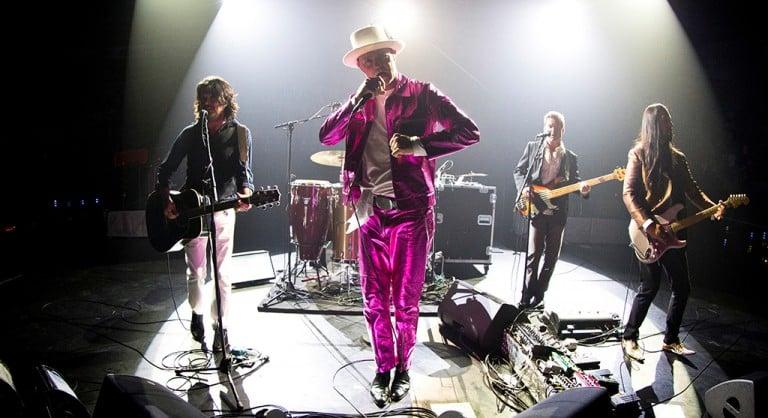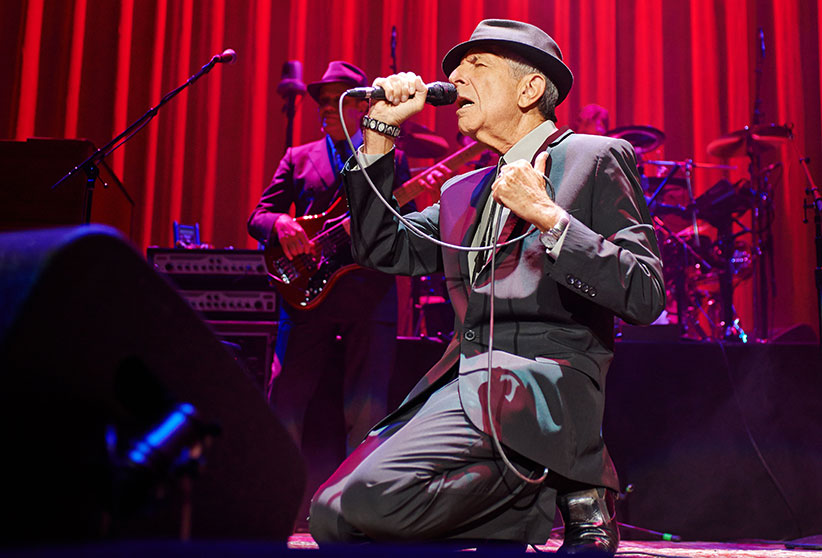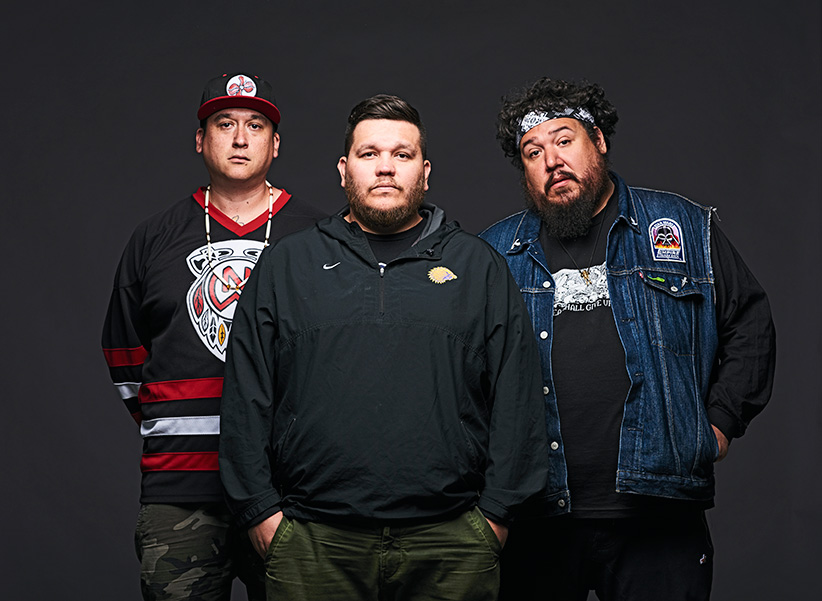The Polaris Music Prize 2017 longlist, by the numbers
Michael Barclay breaks down the diverse longlist of the 2017 Polaris Prize

Tragically Hip lead singer Gord Downie performs with band members Paul Langlois, Gord Sinclair, Johnny Fay and Rob Baker at the Save-on-Foods Memorial Centre to kick off the band’s latest “Man Machine Poem” tour in light of Downie’s brain cancer diagnosis, in Victoria, B.C., Canada July 22, 2016. (Kevin Light/REUTERS)
Share

The Tragically Hip have finally arrived—at least, according to the Polaris Music Prize, an annual critics’ award that is the musical equivalent of the Giller Prize for literature. Thirty years since the Hip formed, with millions of records sold and a truckload of Junos to their name, they now, for the first time in their illustrious career, have a spot on the Polaris Prize longlist, announced on Tuesday in Ottawa, for their 2016 album Man Machine Poem. On top of that, singer Gord Downie’s solo project, Secret Path, also scored a nod.
Voted on by Canada’s music critics, the Polaris usually skews away from Juno favourites and radio darlings, instead turning toward the new, awarding the likes of Owen Pallett, Patrick Watson, Tagaq, F–ked Up and Kaytranada before the mainstream catches on—if it ever does. Occasionally, career veterans like Feist or Godspeed! You Black Emperor take the big prize. One year, it went to a massively popular band when they were at the centre of the zeitgeist: Arcade Fire, in 2011. One year it went to Buffy Sainte-Marie, a rare moment where a respected elder beat out a bunch of young whippersnappers.
FROM MICHAEL BARCLAY: Kaytranada, a Polaris Music Prize winner for the new Canada
Ten of this year’s 40 albums will appear on a shortlist in a month’s time. At the September gala, after being judged by a smaller group selected from the jury, one artist will receive a $50,000 prize. Ottawa electronic group A Tribe Called Red appear to be the odds-on favourite to win this year, for their album We Are The Halluci Nation; other favourites include Japandroids, Feist, BadBadNotGood and Charlotte Day Wilson. Polaris long lists are naturally more baffling for the lay listener than a Juno slate; this year, some of the better known names include Drake, Leonard Cohen, Arkells, Mac DeMarco, Carly Rae Jepsen, New Pornographers, the Sadies and John K. Samson. Here is Maclean’s by-the-numbers deep dive at what we can discern from this year’s long list.

Age
No question, Leonard Cohen is the oldest person to ever appear on a Polaris list: He was 82 when he died shortly after the release of You Want It Darker.
Gord Downie, 53, appears for the first time on a Polaris list, and not once, but twice: once with the Tragically Hip, and once for his Secret Path project. This might not be his last time on a list, either, considering the number of projects he’s recording right now.
Acts like the New Pornographers, John K. Samson, Tanya Tagaq, TUNS and the Sadies are all in their 40s, but most of the list skews young. A year after Polaris awarded its youngest-ever winner in 23-year-old Kaytranada, Toronto hip-hop artist Clairmont the Second makes the list at age 19, likely the youngest-ever nominee in the prize’s history, tied with Un Blonde last year. Hotly tipped soul singer Charlotte Day Wilson is 24.
Demographics
Only 15 longlisted acts feature a woman up front, either as a solo act or fronting a band; that includes two groups where they share lead vocals (Le Couleur, New Pornographers). Those numbers are the same as last year, although this year, none of the bands feature a female instrumentalist in the band who doesn’t sing. (Last year, there were two.)
Eight acts on this year’s list sing or rap in French, up from five last year. Only one French-Canadian act, Karkwa, has ever won the prize.

Genre
Most Polaris acts fall in the broad categories of rock and pop and everything defined as such, including younger folk acts like Leif Vollebekk, Philippe B and Fiver. However, seven acts qualify as hip-hop and/or R&B, from heavyweights Drake and The Weeknd to debuts by Jessie Reyez and Charlotte Day Wilson; instrumental group BadBadNotGood straddle hip-hop and jazz. This year there are fewer acts who might be slotted in the electronic genre, other than frontrunners A Tribe Called Red, their collaborator Lido Pimienta, and Essaie Pas’s Marie Davidson. Metal music rarely sneaks onto the Polaris lists; this year, Vancouver’s Anciients make their second Polaris appearance. Only Tagaq could be considered experimental or avant-garde; only the Sadies could be considered country.
As always, Polaris skews toward the uncommercial. The only acts this year to sell in any significant numbers are Drake, The Weeknd, the Tragically Hip and Leonard Cohen. Pop star Carly Rae Jepsen made the longlist, but to the great consternation of her main fanbase—music critics—she doesn’t sell any records, so she still fits in.
Geography
Last year, Montreal and Toronto had almost an equal share of longlist positions. This year, Toronto takes the lead, while Vancouver remains stuck at five—and everyone else gets the scraps. If they’re lucky, that is: the only East Coast representation is the Toronto band TUNS, comprised of two ex-Haligonians and one Ontarian who has lived in Halifax for 20 years.
Toronto: 15 (includes Maritimers in TUNS)
Montreal: 12 (includes New Brunswick Acadian Lisa LeBlanc)
Vancouver: 5 (includes the now geographically dispersed New Pornographers)
Hamilton: 2
Winnipeg: 2
Ottawa: 1
Kingston: 1
Nomads: 2. Mac DeMarco (Duncan. B.C.; Edmonton; Montreal; Brooklyn; L.A.), Tanya Tagaq (Cambridge Bay, Nunavut; Halifax; Montreal; Brandon, Man.; Toronto)

Previous Polaris experience
Does the Polaris Prize, now in its 11th year, always celebrate the same cast of characters? Let’s take a look at who showed up on this long list.
Previous winners: 2 (Feist, Tagaq). Both have strong records that have a good shot at making the shortlist.
Previous shortlisters: 9 (A Tribe Called Red, BadBadNotGood, Mac DeMarco, Drake, Japandroids, Carly Rae Jepsen, New Pornographers, Sadies, The Weeknd)
Previously in another project on a shortlist: 1 (John K. Samson of the Weakerthans)
Previous long listers: 9. (Alaclair Ensemble, Anciients, Arkells, Philippe B, Louise Burns, Hannah Georgas, B.A. Johnston, Peter Peter, Daniel Romano)
Previously in another project on a long list: 5 (Simone Schmidt, a.k.a. Fiver, has longlisted twice as a member of One Hundred Dollars; Marie Davidson, one half of longlisted act Essaie Pas; Chocolat features longlisted solo act Jimmy Hunt; TUNS featured Chris Murphy, who has been longlisted with Sloan; Figure Walking features longlisted solo artist Greg McPherson)
New to Polaris: 16
Debuts: 5 (Le Couleur, Geoffroy, Jessie Reyez, Weaves, Charlotte Day Wilson)
Kinda debuts: 3 (Marie Davidson of Essaie Pas, Greg McPherson of Figure Walking, Chris Murphy of TUNS)
Polaris Hall of Fame
Drake and the New Pornographers both now tie Dan Boeckner (through his work with Operators, Handsome Furs and Wolf Parade) for the most appearances on a Polaris longlist, at five; Drake, however, has been on three shortlists so far, while Boeckner and the New Pornographers have only been shortlisted twice.
Meanwhile, The Weeknd and BadBadNotGood are now at tied at four Polaris longlisted albums each (and one shortlist each so far).
Creeping up behind them, with three appearances on a Polaris list, are Mac DeMarco, Feist, Japandroids and John K. Samson (both with the Weakerthans and solo). Oh, and the late Leonard Cohen, who is highly unlikely to appear on any future Polaris lists.
Other hall-of-famers from previous years, with four appearances each, are Basia Bulat, Joel Plaskett, Tom Wilson (from Blackie and the Rodeo Kings, and Lee Harvey Osmond) and Patrick Watson.
Not the Junos
Big Juno winners the Tragically Hip and Leonard Cohen are on the shortlist, as are A Tribe Called Red and others who took home Juno hardware in Ottawa last April. The Junos and Polaris have different eligibility periods: The one for the Polaris Prize runs from June 1 to May 31; the Junos’ is a fiscal year starting mid-November.
MORE: A Tribe Called Red plants a flag for the Halluci Nation
Three eligible Juno winners this year who didn’t make it on the Polaris radar:
Shawn Mendes (Fan Choice)
July Talk (alternative album)
Dirty Nil (breakthrough act)
And these eligible Juno nominees were passed over by Polaris:
Billy Talent
Bleeker
Celine Dion
Coleman Hell
Tory Lanez
PartyNextDoor
Sam Roberts
Tegan and Sara
Zeds Dead
None of the nominees in the Juno categories for jazz, country, instrumental, francophone, children’s, classical, reggae, Indigenous, traditional roots, blues, contemporary Christian, world music, metal, and adult contemporary made the list. These specialized genres suffer when contesting for a generalized prize, not unlike how science fiction usually won’t win if it’s competing for a general literary prize.
Heroes to zeroes
Joel Plaskett has been shortlisted twice and longlisted twice; his latest, co-credited to his father, Bill Plaskett, didn’t get a nod. Timber Timbre have been shortlisted twice and longlisted once; their new record only proves they keep getting better. And yet, Polaris voters are clearly tired of them: their 2017 release Sincerely, Future Pollution got snubbed. Tegan and Sara longlisted in 2010 and shortlisted in 2013; their latest, Love You to Death, didn’t make the cut. Ron Sexsmith shortlisted in 2011 with Long Player, Late Bloomer, and although his latest, The Last Rider, has garnered his best reviews since then, it didn’t longlist. Preoccupations used to be called Viet Cong; their appearance on the 2015 Polaris shortlist brought increased attention to their unfortunate choice of name. Either Preoccupations isn’t as memorable a name or Polaris voters were left cold by the new music, the new name, or both.
What does it all mean?
Despite the fact there is almost no experimental, jazz, metal or country on this list—to say nothing of any genre that isn’t rock, pop, folk, R&B or hip-hop—the 2017 Polaris long list is incredibly diverse: few of these acts resemble each other in any meaningful way at all. Even the marquee names like Drake, The Weeknd, Feist and the Tragically Hip are by no means guaranteed a spot on the shortlist: partially because their latest albums were critically divisive, partially because of the overall strength of the Polaris pool. Polaris has always been about discovery: for critics to share gems they uncovered during the past year; for fans to discover acts beyond niche and genre; for everyone to take a closer look at the unfamiliar or, indeed, at the most familiar artists of all, whom we might be taking for granted.
Here’s the full list:
A Tribe Called Red – We Are The Halluci Nation
Alaclair Ensemble – Les Frères Cueilleurs
Anciients – Voice of the Void
Arkells – Morning Report
Philippe B – La grande nuit vidéo
BadBadNotGood – IV
Louise Burns – Young Mopes
Chocolat – Rencontrer Looloo
Clairmont The Second – Quest For Milk and Honey
Leonard Cohen – You Want It Darker
Antoine Corriveau – Cette chose qui cognait au creux de sa poitrine sans vouloir s’arrêter
Le Couleur – P.O.P.
Marie Davidson – Adieux Au Dancefloor
Mac Demarco – This Old Dog
Gord Downie – Secret Path
Drake – More Life
Feist – Pleasure
Figure Walking – The Big Other
Fiver – Audible Songs From Rockwood
Geoffroy – Coastline
Hannah Georgas – For Evelyn
Japandroids – Near To The Wild Heart Of Life
Carly Rae Jepsen – E.MO.TION Side B
B.A. Johnston – Gremlins III
Lisa LeBlanc – Why You Wanna Leave, Runaway Queen?
The New Pornographers – Whiteout Conditions
Klô Pelgag – L’Étoile thoracique
Peter Peter – Noir Éden
Lido Pimienta – La Papessa
Jessie Reyez – Kiddo
Daniel Romano – Modern Pressure
The Sadies – Northern Passages
John K. Samson – Winter Wheat
Tanya Tagaq – Retribution
The Tragically Hip – Man Machine Poem
TUNS – TUNS
Leif Vollebekk – Twin Solitude
Weaves – Weaves
The Weeknd – Starboy
Charlotte Day Wilson – CDW